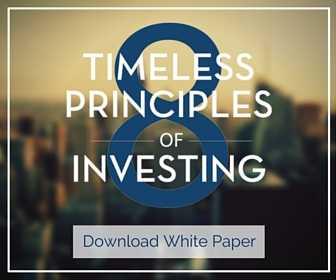All investors can learn from their experiences.
You realize with experience that your long-term objectives are more important than day to day activity. While some investors realize this from the beginning, others gain this insight with experience in the market.
You not only gather more information but begin to understand what matters and what doesn’t. Let’s face it, there’s a lot of “noise” out there and sometimes it’s difficult to separate what matters from what doesn’t. We can purchase one of several financial publications, watch cable networks entirely devoted to following the markets, receive our financial guru or family member’s insight on recent developments via email, and if that isn’t enough, anything else remotely related to financial markets is no more than a click away on our cell phone. How much of this information can anyone possibly need, or use effectively? The experienced investor gets used to tuning out a lot of information, focusing on following a well-designed plan rather than reacting to an oversupply of information.
You understand how your emotions affect your decision making. Our emotions naturally affect our investment decisions. Why would this be the only area of our life that they do not? Rational investment decision making isn’t the norm that our emotions occasionally intrude upon. Our rational decision making is only arrived at by recognizing our natural tendency to react emotionally to events related to our investments. Developing and maintaining a financial plan can give us an alternative to short-term decisions driven by emotion.
You realize how important access to your funds can be. Liquidity is an important investment concern. Many beginning investors focus too heavily on return. This is not terribly surprising. We’re all here to make money, right? Experience will show us that we might need access to our funds along the way. One of the most extreme examples of this is the emergency fund. You know going in today’s interest rate environment that you are unlikely to make a material amount of interest by holding cash in a savings account. It can be tempting to transfer these funds to the brokerage account instead and at least have the opportunity of making a reasonable return. When you need access to the funds, you may be forced to liquidate at a less than advantageous time or pay transaction costs such as surrender fees or commissions depending on the type of investment. Arranging your investments around your liquidity needs will give you the flexibility to meet not only emergencies but short, intermediate and long-term goals.
You understand the value of maintaining your desired allocation. Rebalancing is difficult, so much so that many retirement account participants have never done it. This effectively means their allocations are arbitrarily decided by the movement of markets. It’s not just the discipline of deciding what allocation you want but also remembering to maintain it. Rebalancing is also difficult because it seems so counterintuitive. If you wanted 50/50 stocks and bonds and now you’re at 60/40 because the stocks have done well, it can be difficult to cut back on the recent winners in favor of those assets that have shown less growth. When you do this, you open yourself up to more risk in your portfolio than you may have initially desired. Rebalancing attempts to make sure that your portfolio doesn’t just start at a risk level you’re comfortable with, but that it stays there.
As you get closer to retirement you may wish to gradually approach a more conservative allocation. Your goal is not necessarily to maintain a static model based on your starting point but to make sure your allocation over time is in line with your current objectives.
You stop having emotional attachments to investments. Sometimes investors have reactions to investments based on emotion that may not help them achieve their financial objectives. Own of the most common examples of this is familiarity. We want to understand what we own and thus invest in what we know. For this reason, it can be difficult to accept the asset classes or specific investments we don’t have experience with. Although you may be more comfortable in your knowledge of stocks than bonds (or the reverse), this doesn’t necessarily mean it’s a good idea to have all of your portfolio invested in equities.
A more specific example of this is – bias toward investments in your own geographic region or industry of employment. It’s common to see east coast investors with more bank stocks and west coast investors with more tech stocks, or those working in the pharmaceutical industry owning drug companies. This is not to say you should not own companies that have a regional home field advantage or happen to coincide with your industry, but make sure the proportion you own makes sense for your overall allocation by considering all of your investment options.
You realize that good things come to those who wait. We’ve all heard that patience is a virtue, but this is a virtue hard to maintain with frequent market changes and an unlimited amount of information competing for our attention. Those who have gained from their experience in the market come to understand the benefit of maintaining focus on long-term goals and utilizing retirement investment strategies.












